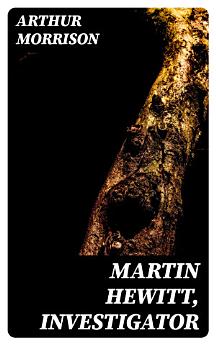Martin Hewitt, Investigator
Arthur Morrison
Set 2022 · DigiCat
E-book
221
Mga Page
family_home
Kwalipikado
info
reportHindi na-verify ang mga rating at review Matuto Pa
Tungkol sa ebook na ito
In "Martin Hewitt, Investigator," Arthur Morrison introduces readers to a captivating world of detective fiction through the eyes of his shrewd and resourceful protagonist, Martin Hewitt. Written in the late 19th century, the collection of stories not only exemplifies the burgeoning genre of detective fiction but also reflects the Victorian fascination with crime and moral ambiguity. Morrison's narrative style is characterized by rich descriptions and intricate plots, employing a subtle blend of suspense and wit, and setting a precedent for later detectives in literature. Each case is an exploration of human psychology, revealing deeper societal issues within the rapidly changing landscapes of the modern city. Arthur Morrison, a British author and journalist, found inspiration in the social challenges of his time—particularly the struggles of the lower classes in London's East End. His firsthand experience as a writer and observer of the city's gritty realities shaped his character-driven narratives. Morrison's unique background provided him with the insight needed to craft compelling mysteries that both entertained and critiqued contemporary society, ushering in a new wave of detective fiction. This collection is highly recommended for aficionados of the detective genre and literary enthusiasts alike. Morrison's intricate storytelling and keen observations not only engage readers with thrilling plots but also encourage them to think critically about the societal issues of his time, making "Martin Hewitt, Investigator" a timeless classic worthy of exploration.
Tungkol sa may-akda
Arthur Morrison (1863–1945) was a significant figure in the landscape of English literature, particularly known for his contributions to the detective fiction genre and social commentary. Born into a working-class family in Poplar, London, Morrison's portrayal of the less-privileged strata of society was drawn from personal experience and observation (Morrison, 1891). He is most acclaimed for his detective series character Martin Hewitt, introduced to readers in 'Martin Hewitt, Investigator' (Morrison, 1894), which showcased his proficiency in creating engrossing mystery narratives. Hewitt, characterized as a shrewd and capable private detective, was seen as a contrast to the deductive prowess of Sherlock Holmes, the creation of his contemporary Sir Arthur Conan Doyle. Morrison's work differs in that it often eschewed sensationalism in favor of realistic depictions of crime and its roots in societal issues. Beyond his detour into detective fiction, Morrison's oeuvre includes seminal works of social realism such as 'A Child of the Jago' (Morrison, 1896), which illuminated the dire conditions of London's slums. His literary style is marked by a stark, unadorned portrayal of the harsh realities faced by the impoverished, and his vivid characterization and immersive urban landscapes have cemented his reputation as a pioneer in both the detective genre and realist fiction.
I-rate ang e-book na ito
Ipalaam sa amin ang iyong opinyon.
Impormasyon sa pagbabasa
Mga smartphone at tablet
I-install ang Google Play Books app para sa Android at iPad/iPhone. Awtomatiko itong nagsi-sync sa account mo at nagbibigay-daan sa iyong magbasa online o offline nasaan ka man.
Mga laptop at computer
Maaari kang makinig sa mga audiobook na binili sa Google Play gamit ang web browser ng iyong computer.
Mga eReader at iba pang mga device
Para magbasa tungkol sa mga e-ink device gaya ng mga Kobo eReader, kakailanganin mong mag-download ng file at ilipat ito sa iyong device. Sundin ang mga detalyadong tagubilin sa Help Center para mailipat ang mga file sa mga sinusuportahang eReader.








